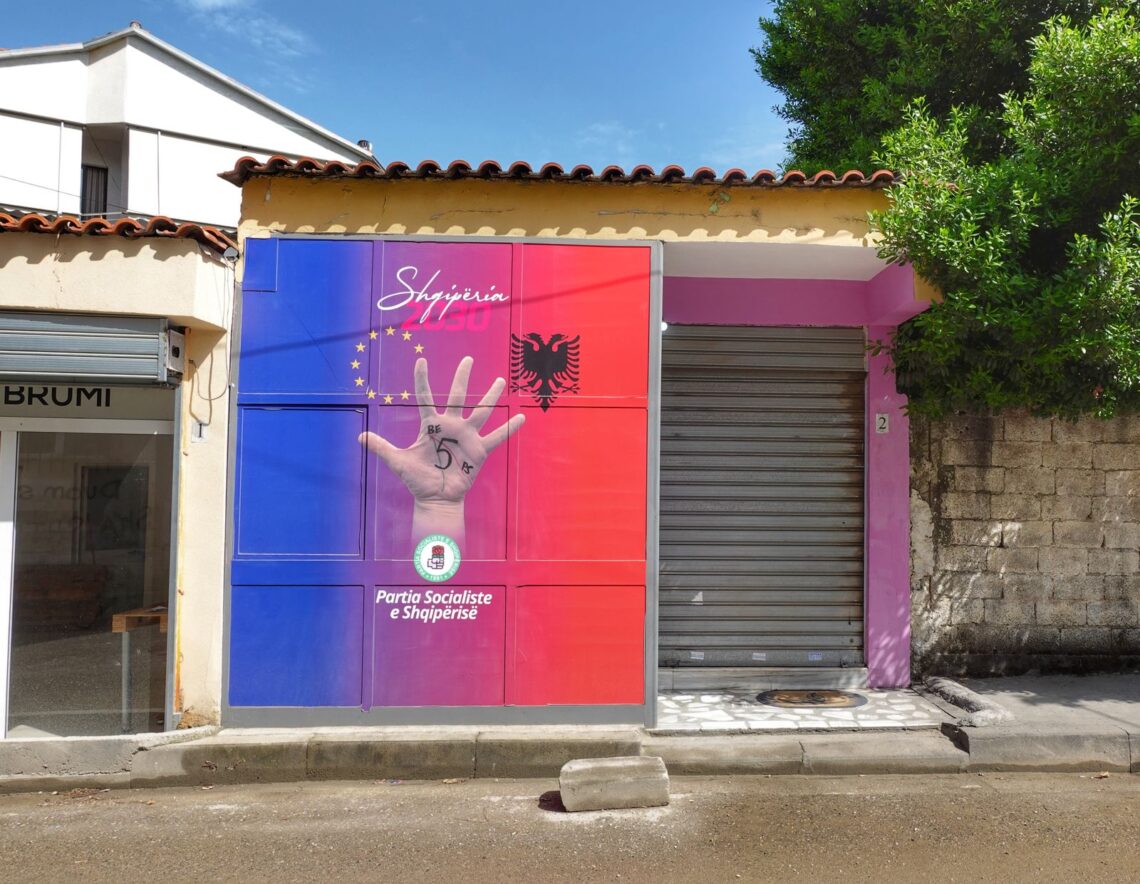As Albania approaches its parliamentary elections in May 2025, the country’s media landscape is under more scrutiny than ever before. Media freedom, the proliferation of fake news, foreign influence, and the control of platforms and portals by individuals with both political and business interests present significant challenges.
Albania, like many nations in the Western Balkans, struggles with a complex web of domestic and external pressures that threaten to disrupt an already fragile democratic discourse. Recent developments, including a controversial ban on TikTok and a new disinformation commission, have raised questions about the balance between combating misinformation and preserving freedom of expression. These questions become even louder as the country is set to vote in general elections in May, choosing between the incumbent Socialist Party, which is on track to win a fourth mandate, a coalition of centre-right opposition parties, or a handful of independent parties from every side of the spectrum.
Media Freedom in Albania: Progress and Persistent Challenges
Albania has made strides in improving media freedom since the fall of its communist regime in the early 90s, but it is far from perfect. The country’s media environment is rated as “partly free” by Freedom House, but in the latest Reporters Without Borders (RSF) World Press Freedom Index, Albania improved by 18 places. The organisation did, however, observe that press freedom and media independence in the country continue to be threatened by conflicts of interest between business and politics, with undertones from organised crime. In addition, a flawed legal framework and partisan regulation causingadditional problems
The main issue in Albania is that of media ownership. The few TV stations that receive the lion’s share of views are owned by a handful of rich businesspeople with interests in multiple sectors, including banking and construction. They use their portals both on TV and online to curry favour with the government, or levy attacks against political or business opponents. State funding and advertising also contributes a significant chunk to media revenue, but it is an opaque system leading to suspicions and accusations of influence peddling. This business model also results in pressures on journalists to self-censor and not cover stories or editorial lines that could go against the interests of their owners and by default, their interests. Fear of having salary withheld, as well as being fired, or blacklisted from the industry loom over the heads of many.
This makes the landscape for independent media extremely challenging. One of the country’s most outspoken and critical investigative platforms, Exit.al, shut down in 2022 due to a lack of funding. Others struggle to raise funds and instead rely on projects with embassies and NGOs, which in turn leads to bias in favour of those interests. Subscription models are yet to take off in Albania due to a largely cash economy, a reluctance to use debit cards, low salaries, and an oversaturation of free media with some 900 plus online portals pushing out multiple articles a day. This combined with the rise of news on social media and YouTube, as well as over 120 TV channels, means the market is small for those who want to charge for their content.
On top of all of this, polarisation often results in attacks on journalists from business people, politicians, and even portals that align with different political parties. Online trolling, threats, and smear campaigns have been reported but are not quite as common as they once were.
In addition, Strategic Lawsuits Against Public Participation (SLAPPs) are also a growing concern, as influential individuals and businesses use legal threats to silence critical voices.
Despite these challenges, organisations like the Albanian Media Council are working to promote ethical journalism and advocate for better protections, signalling a gradual improvement in the sector. The creation of the country’s first self-regulatory platform, the Ethical Media Council, have also helped create more trust in the sector and offer solutions to some of the persistent issues.
The Fake News Problem
Fake news is a significant issue in Albania, mirroring trends across the rest of the Western Balkans. The proliferation of misinformation, often spread through social media and by portals that copy and paste content without fact checking, undermines public discourse and erodes trust in institutions.
Sensationalist headlines, fabricated stories, and manipulated images usually circulate, particularly during politically charged periods, such as local or general election campaigns. Albania’s relatively low media literacy rates exacerbate the problem, making citzens more susceptible to false narratives.
Another significant issue in Albania is portals using blackmail to get money from businesses and individuals, or forcing them to take out hefty advertising contracts. A portal, sometimes legitimate, sometimes not, will contact the entity, offering them advertising. If they refuse, they threaten to run bad press or fake stories about them. Some portals do not even offer advertising, they simply demand large sums of money under the threat of publishing stories that will destroy their reputation and credibility.
This phenomenon not only damages the trust of the public in the media, but also the trust of those who should engage with the media. A communications executive at a local bank said that the institution now has a policy of not answering media requests or questions, to avoid being targeted by such scams. They added that while they understand not all journalists have such nefarious intentions, it is easier to have a blanket ban, rather than risk engaging with blackmailers.
Russian Influence
Russian disinformation campaigns have been a growing concern across Europe, particularly in the Balkans, where Moscow seeks to counter Western influence and sow instability. Countries like Serbia and Montenegro have faced well-documented Russian interference, including fake news campaigns and support for pro-Russian political actors.
In Kosovo, Russian actors have been blamed for stoking up ethnic tensions between Kosovo Albanians and Serbs, and boosting pro-Serbia sentiments in local media. In Albania, however, Russia’s influence appears more limited. Albania’s strong pro-Western orientation, rooted in its NATO membership and aspirations for the EU, makes it less receptive to Russian narratives. It also lacks historic ties with Russia related to language, religion, or culture, all things that some neighbouring countries share to some extent.
That said, Albania is not immune to indirect Russian influence. Disinformation campaigns often exploit existing societal divisions, such as economic discontent or anti-government sentiment, which can strike a chord with Albanian audiences. For instance, Russian-backed narratives about Western corruption or NATO’s ineffectiveness occasionally surface on fringe websites and social media accounts.
A 2025 report by the European Centre for Press and Media Freedom (ECPMF) noted that while direct Russian interference in Albania is minimal, the country’s weak media infrastructure makes it vulnerable to external manipulation, particularly during elections.
That said, a 2023 report from BIRN found that of 384 cases of Russian disinformation debunked by the EUvsDisinfo database, only 22% found their way into Albanian language media in Albania, Kosovo and North Macedonia. A total of 377 articles peddling Russian disinformation were identified, mainly downplaying Russian atrocities committed in Ukraine, justifying Russia’s invasion, positioning the US and NATO as a threat, and critiques of the European Union.
Meanwhile, the Russian Embassy in Tirana– a source of disinformation and propaganda, is largely ignored by the media, unless it is to point out the inconsistencies in their statements. In short, Albania is largely immune to Russian disinformation and it maintains an extremely Russo-sceptic stance. While Albania has not reported or experienced disinformation like its neighbours, the potential for spillover effects remains, especially given the country’s reliance on social media platforms like Instagram and TikTok for information.
The TikTok Ban: A Controversial Response to Disinformation
In March 2025, the Albanian government made headlines by suspending TikTok nationwide for at least 12 months, citing concerns over violence and bullying among children. The decision, however, sparked widespread criticism from media freedom advocates, who argued it threatened freedom of expression, particularly ahead of the May 2025 elections. The SafeJournalists Network and Media Freedom Rapid Response (MFRR) expressed alarm, noting that the ban could set a precedent for broader censorship.
The timing of the TikTok ban is particularly contentious. With elections looming, social media platforms are critical for political campaigning and public discourse. Critics argue that the ban disproportionately affects younger voters, who rely on TikTok for political engagement, and could stifle opposition voices, something the government denies.
At the time of writing, TikTok is still accessible with and without a VPN, with some slow loading times and lags in service. Most of the country’s media, influencers, and politicians are still actively posting on the platform, including some from the ruling party.
The Battle for Airtime
Television, a primary information source for Albanians, is a crucial part of the 2025 election campaign. The Electoral Code mandates equal airtime for political parties, overseen by the Central Election Commission (CEC). Major parties like the Socialist Party (SP) and Democratic Party (DP) receive equal free airtime on public broadcaster RTSH, while smaller parties get proportional slots. Paid advertisements must be clearly labeled, with airtime limits to prevent dominance by wealthier parties. The Audiovisual Media Authority (AMA) monitors compliance, but enforcement is inconsistent. Private TV stations are often accused of skewing coverage toward favored parties through selective reporting or biased debates.
A 2024 OSCE report noted that 60% of private TV airtime favored the SP, undermining fairness, something media argues is due to the fact they are currently in government, so by default, take up more airtime. Smaller parties struggle for visibility, risking voter marginalization and instead rely on social media platforms and livestreaming. Ahead of May’s votes, all the main international bodies have called for equal and fair airtime on TV stations and for journalists to be neutral in their reporting.
Conclusion
While progress in media freedom in Albania is evident, challenges such as political interference, fake news, and the media ownership issue persist, and until that is resolved, the other issues will continue. Russian influence, though less pronounced than in other Balkan nations, remains a latent risk, particularly given Albania’s vulnerable media infrastructure. By prioritising media literacy, and promoting independent financial models, Albania will likely find that many of the issues its media sector faces will resolve. But there is no time for sweeping reforms and societal shifts before the election, instead citizens will have to balance between the online and TV media they consume, and the riot of information available on social media, meanwhile the onus is on journalists to be even more professional and neutral than before.
Follow The Balkanista!




